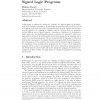Free Online Productivity Tools
i2Speak
i2Symbol
i2OCR
iTex2Img
iWeb2Print
iWeb2Shot
i2Type
iPdf2Split
iPdf2Merge
i2Bopomofo
i2Arabic
i2Style
i2Image
i2PDF
iLatex2Rtf
Sci2ools
119
click to vote
SLP
1994
1994
Signed Logic Programs
In this paper we explore the notion of a \signing" of a logic program, in the framework of the answer set semantics. In particular, we generalize and extend the notion of a signing, and show that even for programs with classical negation and disjunction the existence of a signing is a simple syntactic criterion that can guarantee several di erent sorts of good behavior: consistency, coincidence of consequences under answer set and well-founded semantics, existence of \standard" answer sets expressible in terms of the well-founded model and a signing for the program, and a restricted monotonicityproperty. The key technical result in this paper is a theorem relating the consequences of a signed disjunctive program with classical negation to the consequences of the members of a closely related family of signed nondisjunctive programs. These nondisjunctive programs are the \covers" of the disjunctive program, where a cover is any program that can be obtained by removing all...
Related Content
| Added | 02 Nov 2010 |
| Updated | 02 Nov 2010 |
| Type | Conference |
| Year | 1994 |
| Where | SLP |
| Authors | Hudson Turner |
Comments (0)

